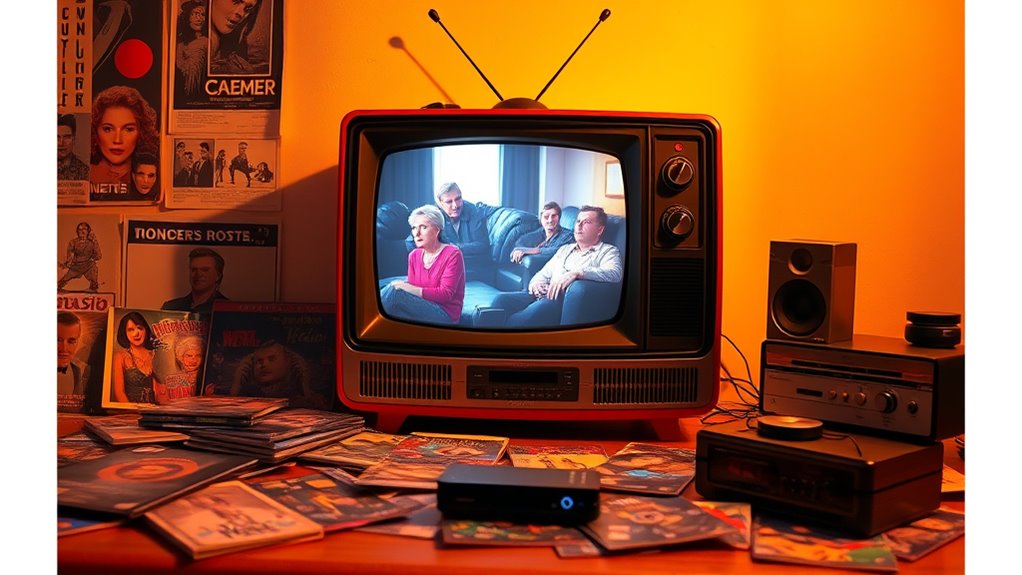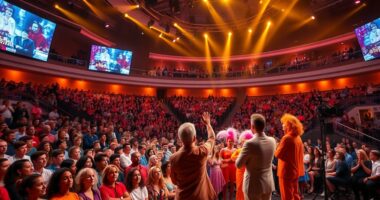Reboots and revivals return because they tap into your nostalgia, offering familiar stories that provide comfort and familiarity amid a changing world. They attract audiences by balancing respect for the original with fresh perspectives, often appealing to both longtime fans and new viewers. Casting challenges, modern sensibilities, and diversity play key roles in their success. If you want to understand what makes these reboots work so well, keep exploring the latest insights into this trend.
Key Takeaways
- Nostalgia drives audiences to reconnect with familiar stories and characters from their childhood or earlier eras.
- Reboots capitalize on ongoing trends to attract both longtime fans and new viewers.
- They offer a sense of comfort and continuity amid a rapidly changing entertainment landscape.
- Successful reboots balance honoring original content with modern updates and diversity.
- They aim to engage multiple generations, blending legacy with innovation for broader appeal.

In recent years, reboots and revivals have become a dominant trend in the entertainment industry, breathing new life into beloved shows and movies from the past. This surge is driven by a powerful sense of nostalgia trends, as audiences crave familiar stories that evoke happy memories and childhood connections. When a show from decades ago is brought back, it taps into a collective yearning for the past, providing comfort and a sense of continuity amidst a rapidly changing world. But behind the scenes, many producers face significant casting challenges. Finding actors who can embody iconic characters while appealing to both old fans and new viewers isn’t easy. Fans have high expectations, and they often compare new actors to their beloved originals, making it difficult to strike the right balance. Sometimes, the challenge lies in casting younger actors who can carry the torch while respecting the show’s legacy. Other times, executives struggle to find the perfect fit for roles that defined an era, risking alienating long-time fans if they stray too far from the original cast or tone.
The casting process becomes even more complex when considering diversity and modern sensibilities. You need actors who not only resemble the original characters but who also bring fresh perspectives that resonate with today’s audiences. *Furthermore*, there’s pressure to find talent that can convincingly recreate the chemistry and dynamics that made the original cast special. Additionally, the casting process can be influenced by the availability and willingness of original stars to return, often requiring creative solutions or new interpretations of classic roles. This challenge is compounded by the fact that some stars from the original series might be unavailable or unwilling to return, forcing producers to seek new faces or reinvent characters altogether. These casting challenges often influence the storylines and tone of the reboot, as producers aim to balance nostalgia with innovation. They want the show to feel familiar enough to satisfy fans but fresh enough to attract a new generation.
Ultimately, the success of a reboot hinges on mastering these casting challenges while tapping into nostalgia trends. When done right, the result is a show that honors its roots but also evolves with the times. You get a sense of familiarity mixed with excitement for something new, which keeps audiences engaged across generations. It’s a delicate dance—respecting the past while embracing change—and it’s why reboots and revivals continue to dominate the entertainment landscape.
Frequently Asked Questions
How Do Producers Decide Which Shows to Reboot?
Producers decide which shows to reboot by analyzing casting considerations and audience demographics. They look for shows with a strong fan base or nostalgic appeal that can attract both old and new viewers. If the original cast is unavailable, they consider new talent that fits the show’s tone. Ultimately, they choose projects with potential for fresh storytelling, ensuring the reboot resonates with current audience preferences and maximizes commercial success.
Are Rebooted Shows More Successful Than Original Series?
Rebooted shows often outperform original series, thanks to their nostalgic appeal and modern updates. You’re drawn to the familiar characters and storylines, but appreciate contemporary twists that keep things fresh. This combination attracts both longtime fans and new viewers, boosting success. While some reboots thrive, others struggle; it depends on how well producers balance honoring the past with adding relevant, engaging content for today’s audience.
How Do Fan Expectations Influence Reboot Decisions?
Fan expectations heavily influence reboot decisions because creators want to tap into the nostalgic appeal that draws viewers in. You, as a fan, often engage more with reboots that honor the original, which encourages producers to meet those expectations. If fans express excitement and positive engagement, the reboot is more likely to succeed. Conversely, high expectations can also pressure creators to deliver a version that resonates with the loyal audience.
What Are the Legal Challenges in Rebooting Old Shows?
You face legal challenges like copyright disputes and licensing hurdles when rebooting old shows. Copyright disputes can delay or block your project if rights are unclear or contested. Licensing hurdles require you to secure permissions from multiple rights holders, which can be time-consuming and costly. Managing these legal issues demands careful planning and negotiations to guarantee you’re compliant with all intellectual property laws, helping your reboot move forward smoothly.
Do Reboots Stay True to the Original Show’s Spirit?
About 60% of reboots aim to stay true to the original show’s spirit, driven by fan loyalty and nostalgia factor. You’ll find that creators often preserve key elements to meet expectations, but some updates modernize themes and characters. While some reboots succeed in capturing the essence, others drift away. Ultimately, it’s a delicate balance, and your connection to the original influences how well the reboot resonates.
Conclusion
Reboots and revivals breathe new life into old favorites, proving that nostalgia is a powerful engine for today’s entertainment. They’re like a familiar song that you didn’t realize you missed until it’s played again, reminding us why these stories stay with us. By blending the past with the present, they create a bridge across generations, ensuring these shows remain timeless. After all, some classics are too good to stay gone forever—they’re simply waiting for their encore.









